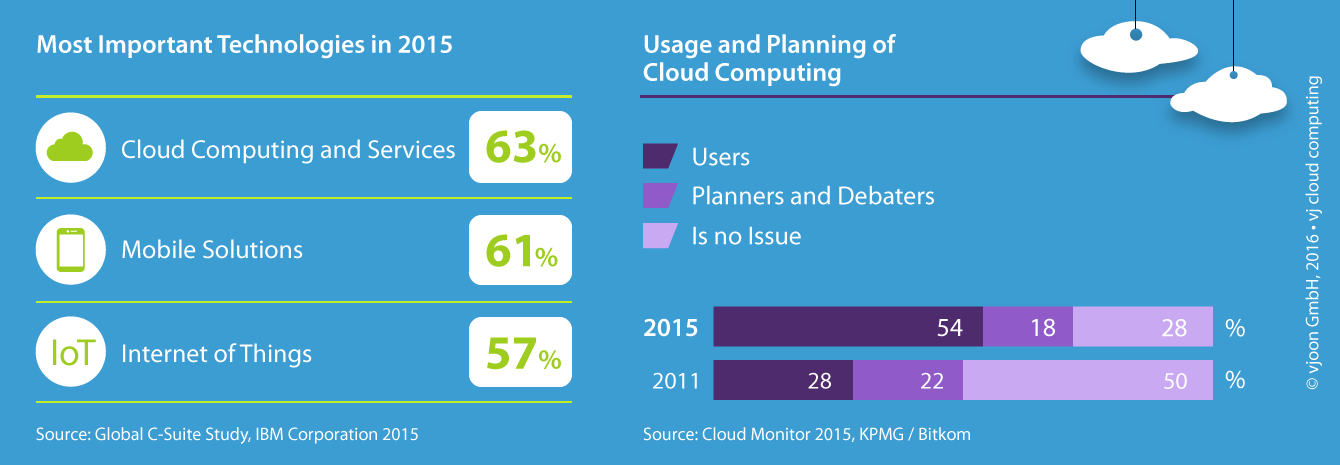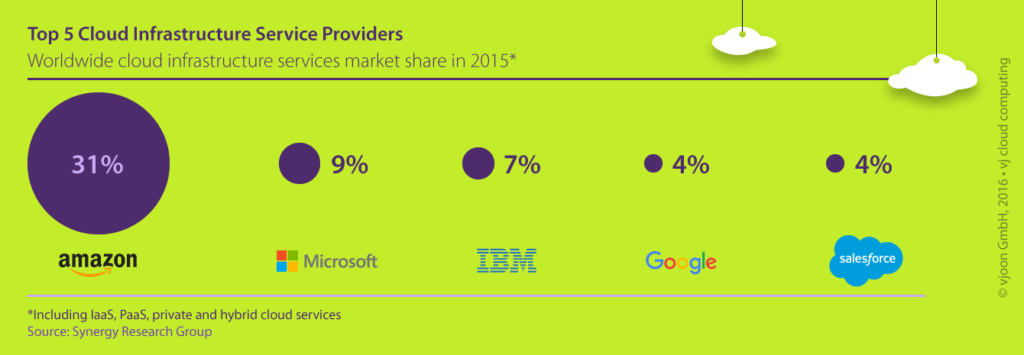
Digital transformation: Not without my cloud
Cloud computing is currently one of the most important IT topics and will probably remain as such for the coming years. That’s not only a feeling of the author but can be proved by several studies. A survey by IBM, covering 5,247 C-level managers (CxO) from 70 countries, revealed that cloud computing is the most important digital transformation for approximately two-thirds (63%) of the respondents, even before mobile technologies (61%) and the Internet of Things (57%).
But, to rate the topic as important, doesn’t necessarily say anything about daily business or its implementation. A study from KPMG in cooperation with Bitkom provides a good overview of that. 54% of the interviewed companies are already using cloud services, added by 18% that are engaged in this subject. In 2011, cloud services had been used only by 28%. And, while in the beginning, most enterprises and larger companies thought the topic was important, it now also appears on the agenda of small and medium-sized companies.

What drives enterprises into the cloud?
According to a recently published study from IDC, 6 of 10 respondents identified cloud computing as the most important issue for digital transformation. And this even before big data and mobility. By using cloud services, the respondents from both, the IBM and the KPMG study expect more agility and speed, lower capital expenditures and operating costs, more productive use of IT, and easier collaboration.
Will the cloud keep its promises?
In fact, most of the objectives will be achieved. The KPMG study indicates, that 74 percent of the respondents report improved access. A similar picture is drawn for faster scalability, better performance, and decreasing costs. Of course, there are also criticisms and concerns about cloud usage. The “Rightscale 2016 State of the Cloud Report” names in the first place, the companies concerns about the lack of resources and expertise. This is followed by security and compliance aspects. The year before it was exactly the opposite. In Germany, security issues like unauthorized access or data loss are at the top of the list. Nevertheless, the KPMG study cites that the values for Germany in 2016 are particularly lower, indicating a trend to fewer concerns about cloud computing in Germany.
Legal issues arose, especially in Europe. Because of the EU Court of Justice‘s Safe Harbor judgment, many companies came into difficulties, not only the cloud service providers themselves, but their customers in Europe as well. To meet the EU privacy requirements, a lot of data centers have emerged in Europe subsequently. This step was particularly important for Amazon Web Services (AWS). AWS is the largest provider of cloud infrastructures worldwide, representing a 31% market share. The implementation of the new agreement “EU-US Privacy Shield” will show if this development will continue.

The cloud for publishers and marketers: intelligent data management required
Every industry and geographic region is influenced by certain factors, like business processes, broadband access, or the legislative framework. But, at the end of the day, agencies, brands, and media companies pursue the same objectives as companies from any other industry. Scalable and high-performance cloud solutions, like AWS and others, are most suitable for media companies, with their huge archives and extensive production data, or for the booming content marketing sector,
To always use a modern, high-performance IT infrastructure and reduce medium- and long-run costs, entire production environments can be moved into the cloud. Thereby, intelligent data management concepts can help to use automated processes to connect different storage locations in the background. Considering the fact that, according to IDC, hybrid clouds (linking a company‘s traditional IT environment with private, hosted, or public cloud services) are becoming more and more important for an enterprise’s IT plannings, this factor should not be underestimated.
Read also our companion piece on digital transformation within corporate communication here.

